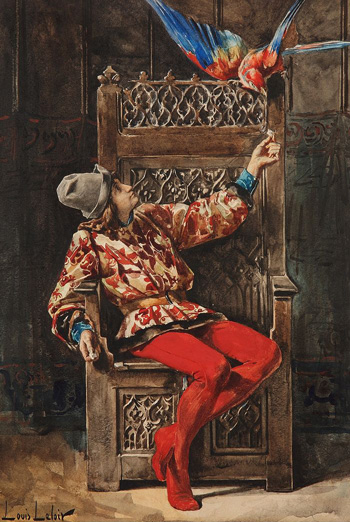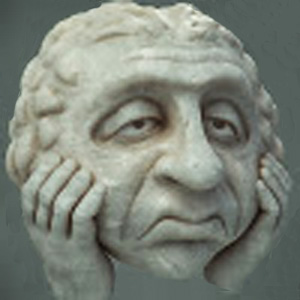Catholic Virtues
 |
 |
 |
 |
 |
 |
 |
True & False Paths to Happiness - I
False Roads Men Take to Find Happiness
In his search for happiness, man can be deceived by four false paths.
Some men mutter under their breath:“Unless I am happy my life is miserable, lost, a failure.”
 For many, living a happy life is to breathe with contentment. The more the merrier! The successful man would be one who achieves this contentment. And the further you are from that goal, the less happy you are.
For many, living a happy life is to breathe with contentment. The more the merrier! The successful man would be one who achieves this contentment. And the further you are from that goal, the less happy you are.
The man seeking this happiness thus tries to guess what characteristics are required to achieve what he so greatly desires. Obviously, he thinks, they are the qualities that make one go forward in life. For the modern day “saint” – that is, the perfect man of our secular era – is the one who achieves great things in life. Anyone who does not take this path is off track or amiss.
There are four types of “winners” who would fit this pattern. Where each one falls, depends on his inclinations, abilities, preferences and concrete circumstances of his life.
I would summarized these modern models in four:
Moved by one of these four myths, the candidate to be a happy man, at the age of illusions, launches himself into the struggle for life.
Will he win happiness? Let no one be deluded.
The ‘man who has’
Perhaps it can be said that today the myth of the “man who has” is the most powerful. For many imagine that if they had enough money, the possibility to enter all the satisfying roads of life would open to them.
As such, they make the possession of money their greatest concern. Money becomes the topic of greatest interest to them. They place all their happiness in the hope that they will never be poor and instead become ever richer and therefore, ever happier.
 Happier... Here it is worth recalling, among many others, the case of Christina Onassis, the daughter of the possibly richest man in the world in her day. Christina, according to a journalist at Le Monde, ”could be said to have been born with a golden spoon in her mouth.” Suffice it to say that her dolls were dressed by the famous designer Christian Dior...
Happier... Here it is worth recalling, among many others, the case of Christina Onassis, the daughter of the possibly richest man in the world in her day. Christina, according to a journalist at Le Monde, ”could be said to have been born with a golden spoon in her mouth.” Suffice it to say that her dolls were dressed by the famous designer Christian Dior...
Her father lived trying to foresee and fulfill her every whim, so that even before she could say, “Daddy, I want such-and-such a thing,” she already had it.
This is the golden dream of so many persons! Millions and millions ardently aspire to the situation that Cristina Onassis already had at birth.
But, as the journalist writes: “It was a way too full. Too much unhappiness, too many marriages, too many divorces, too many pounds, too many whims immediately satisfied, that ultimately led to an extreme loneliness ... ”
She took drugs trying to escape to a dream world because all that she had was not enough for her. And so, she took the fatal overdose at age 37.
The journalist concludes: ”A father, even one who is omnipotent, a multi-millionaire, can buy everything except happiness, and prevent everything except misfortune.”
In reality, the financial concern has to be collateral, under the pain of loving more what one should love less, and loving less what one should love more.
The result is misfortune. The “man who has” is not automatically happy just because he has things.
The ‘man who knows’
Alongside the first stands the “man who knows.” Undoubtedly, knowing is more elevated than having. But does just knowing satisfy?
For example, Pico della Mirandola (1463-1494) was a true Onassis of erudition in the Renaissance era. It was said of him that he knew everything that should be known and quibusdam alias (and then a few more things). Would he be happy because of that?
[At the age of 31, he was murdered – or took his own life – along with his male lover by arsenic poisoning].
The ‘man who makes’
 There is also the “man who makes.” He is, as they say in the United States, a workaholic , that is, addicted not to alcohol but to work. He tries to compensate for the miseries of life by self-realization in action, turning even painful things, such as toil can often be, into a source of intemperate pleasure.
There is also the “man who makes.” He is, as they say in the United States, a workaholic , that is, addicted not to alcohol but to work. He tries to compensate for the miseries of life by self-realization in action, turning even painful things, such as toil can often be, into a source of intemperate pleasure.
What fascinates him is work-agitation, work-accomplishment, work-intoxication, independent of its outcome. It does not seem that in principle he is a happy man.
The ‘man who can’
Will happiness be achieved by the “man who can,” that is, the one who has power? It is difficult to say. For the degree of happiness and unhappiness is measured by the degree of tranquility and non-tranquility. And power is often a source of the latter, to name just one drawback.
I don’t believe that any of these models is a source of true happiness. They are false models that the world presents to men in order to divert them from their true path to happiness.
Egalitarianism is also not the path to happiness
 Today there is a tendency to present oneself as equal to everyone else, thinking on the same level as everyone else, knowing what everyone knows, having no more than others, and doing no more than others do. Ashamed to be less, ashamed to be more.
Today there is a tendency to present oneself as equal to everyone else, thinking on the same level as everyone else, knowing what everyone knows, having no more than others, and doing no more than others do. Ashamed to be less, ashamed to be more.
Thus, not wanting anything more, encountering no difficulties, this mediocre man can manage – or at least try – to vegetate without passion.
Such a man could say at the moment of his death: "I did nothing, wanted nothing, and left nothing!"
It is even more vile than the previous cases mentioned above. It merits the following diagnosis: the happiness of swine.
Thus do we see that the abomination of egalitarianism is not a path to happiness.
Continued

Some men mutter under their breath:“Unless I am happy my life is miserable, lost, a failure.”

Which are the false and true models for happiness?
The man seeking this happiness thus tries to guess what characteristics are required to achieve what he so greatly desires. Obviously, he thinks, they are the qualities that make one go forward in life. For the modern day “saint” – that is, the perfect man of our secular era – is the one who achieves great things in life. Anyone who does not take this path is off track or amiss.
There are four types of “winners” who would fit this pattern. Where each one falls, depends on his inclinations, abilities, preferences and concrete circumstances of his life.
I would summarized these modern models in four:
- The “man who has”: the affluent, the millionaire, the banker.
- The “man who knows”: the teacher, the academic, the scientist, the researcher, the philosopher, etc.
- The “man who makes”: the entrepreneur, the builder, the organizer, etc.
- The “man who can, who has power”: the politician, the leader, etc.
Moved by one of these four myths, the candidate to be a happy man, at the age of illusions, launches himself into the struggle for life.
Will he win happiness? Let no one be deluded.
The ‘man who has’
Perhaps it can be said that today the myth of the “man who has” is the most powerful. For many imagine that if they had enough money, the possibility to enter all the satisfying roads of life would open to them.
As such, they make the possession of money their greatest concern. Money becomes the topic of greatest interest to them. They place all their happiness in the hope that they will never be poor and instead become ever richer and therefore, ever happier.

She had ships named after her & all possible money, but could not buy happiness

Her father lived trying to foresee and fulfill her every whim, so that even before she could say, “Daddy, I want such-and-such a thing,” she already had it.
This is the golden dream of so many persons! Millions and millions ardently aspire to the situation that Cristina Onassis already had at birth.
But, as the journalist writes: “It was a way too full. Too much unhappiness, too many marriages, too many divorces, too many pounds, too many whims immediately satisfied, that ultimately led to an extreme loneliness ... ”
She took drugs trying to escape to a dream world because all that she had was not enough for her. And so, she took the fatal overdose at age 37.
The journalist concludes: ”A father, even one who is omnipotent, a multi-millionaire, can buy everything except happiness, and prevent everything except misfortune.”
In reality, the financial concern has to be collateral, under the pain of loving more what one should love less, and loving less what one should love more.
The result is misfortune. The “man who has” is not automatically happy just because he has things.
The ‘man who knows’
Alongside the first stands the “man who knows.” Undoubtedly, knowing is more elevated than having. But does just knowing satisfy?
For example, Pico della Mirandola (1463-1494) was a true Onassis of erudition in the Renaissance era. It was said of him that he knew everything that should be known and quibusdam alias (and then a few more things). Would he be happy because of that?
[At the age of 31, he was murdered – or took his own life – along with his male lover by arsenic poisoning].
The ‘man who makes’

The workaholic who lives to labor
What fascinates him is work-agitation, work-accomplishment, work-intoxication, independent of its outcome. It does not seem that in principle he is a happy man.
The ‘man who can’
Will happiness be achieved by the “man who can,” that is, the one who has power? It is difficult to say. For the degree of happiness and unhappiness is measured by the degree of tranquility and non-tranquility. And power is often a source of the latter, to name just one drawback.
I don’t believe that any of these models is a source of true happiness. They are false models that the world presents to men in order to divert them from their true path to happiness.
Egalitarianism is also not the path to happiness

I did nothing, wanted nothing & left nothing!
Thus, not wanting anything more, encountering no difficulties, this mediocre man can manage – or at least try – to vegetate without passion.
Such a man could say at the moment of his death: "I did nothing, wanted nothing, and left nothing!"
It is even more vile than the previous cases mentioned above. It merits the following diagnosis: the happiness of swine.
Thus do we see that the abomination of egalitarianism is not a path to happiness.
Continued

Posted January 13, 2020





